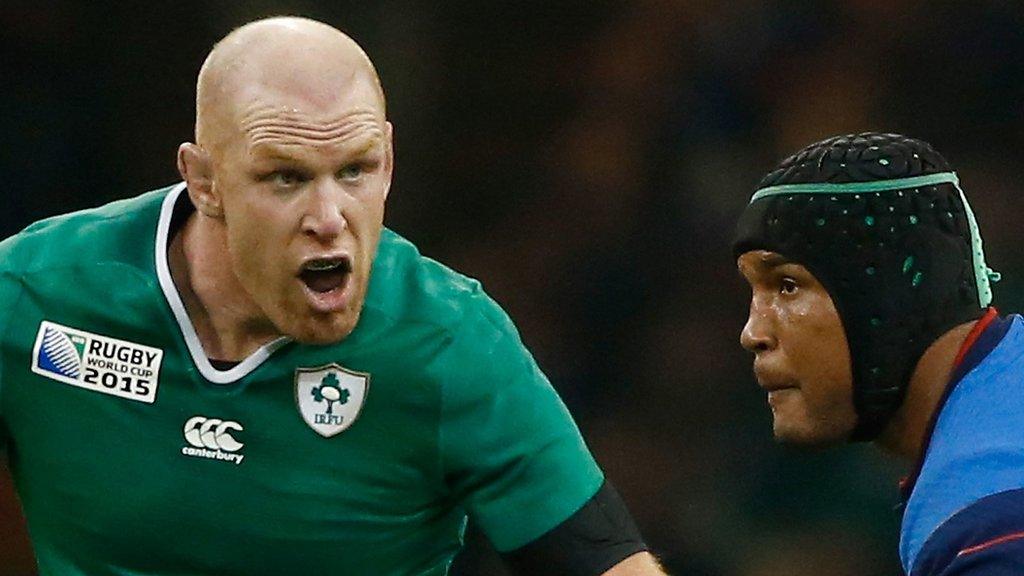Phil Eggleshaw: Why I left professional rugby to start a family
- Published
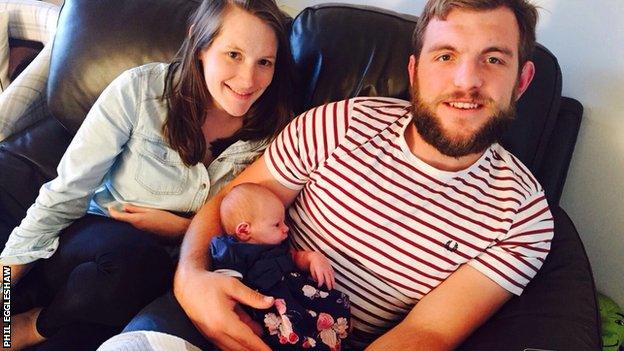
Phil Eggleshaw with wife Ruth and daughter Lucy
In the Championship, professional rugby meets the part-time game in England's second tier, some athletes are offered contracts well below the living wage, there is insufficient medical insurance and a feeling of being ignored by the game's hierarchy.
Former Doncaster and Nottingham back-row forward Phil Eggleshaw tells BBC Sport what Championship life was like for him before eventually deciding to reconsider his career to start a family.
After eight years in professional rugby, spent almost entirely in the Championship, I had to decide between my playing career and plans of being a father.
The choice was either extend my time in Doncaster, join one or two other clubs in the league, or try and find a secure job where I could pay for the family I was hoping to start with my wife, Ruth.
I chose to move away from professional rugby at the age of 26.
So, I got a job in the real world and have managed to continue to play rugby part-time for Hull Ionians, where, despite being in the third tier, I made more money directly from rugby last year than I had for most my years as a professional.
I have recently become a father and feel that if I had chosen to play on for a living I couldn't have afforded it - financially, playing in the Championship was unlikely to cover the cost of my monthly bills with a young family.
This, combined with the chance of injury, which could affect my ability to help my wife look after my child for a period of time, has made me think that I may have made the correct decision.
'Excitement when the Championship started'
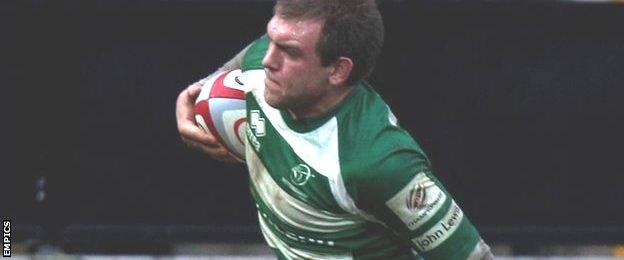
Phil Eggleshaw in action for Nottingham in 2011
Having been brought through Nottingham's academy system, I stated my senior career in the old National One competition - the precursor to the Championship.
When it transformed into the Championship there was excitement - the feeling was that it was likely to become fully professional and allow for greater things in the years to come.
In the final years of National One, I was part of a Nottingham side that had gone through some serious financial difficulties., external Nevertheless, the club was energised by the changes in the Championship and went fully professional for the first time.
Less than a decade on, is the landscape of the Championship so different? Yes, some clubs that went 'professional' have seemingly managed to maintain full-time squads, while this season Richmond came up and maintained their status as part-timers.
'Happy to play for little money'
I began by career as a part-time player, juggling my studies at Durham University with training in the East Midlands.
Nottingham were good enough to give me a car with all expenses paid and match fees on top. At the time, it was absolutely fine as I was a full-time student.
My first professional deal came ahead of 2010-11 season and the money was pretty poor - about £10,000. But luckily the director of rugby at the time helped carve out a role for me as the community development officer, meaning that I could add to my base rugby contract.
At the time, and I am sure this is how others feel today, I was happy to play for the small amount of money. The contract was an incremental three year contract and should I progress well by the third year, I would earn a handsome amount of money in Championship terms.
I felt that at the age of 21, while the first year may be tough financially, if I was good enough then I would soon see the benefits.
'Injuries and having to start again'
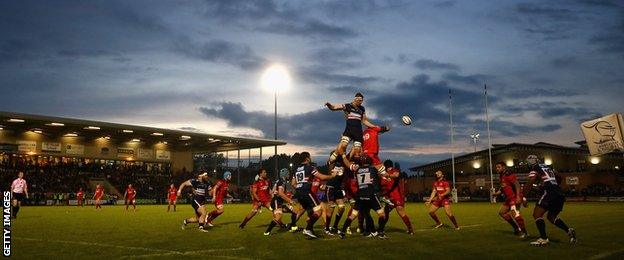
Doncaster Knights won promotion back to the Championship after just one season in National One in 2013-14
Sadly, at the end of my three years with Nottingham I'd suffered a large number of injuries.
With a change of rugby management that same season, playing just six games that term was not enough to convince the club to keep me on. I moved to Doncaster, who had just been relegated from the Championship.
Again, the money was pretty average, but I felt if I could avoid injuries then I would be able to succeed and again be able to bargain for more money in the future.
This, however, was not to come true, as 10 games into the season with Doncaster in National One I re-injured the same shoulder that I hurt a year earlier with Nottingham. It kept me out for the rest of the season.
I don't blame anyone for the problems I personally had in my career.
Injuries are all a part of any contact sport, it's a risk we all go through in life and all bodies are made different - looks like mine was made from crystal.
'I could not afford insurance'
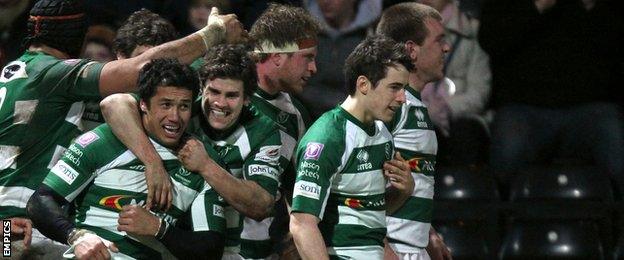
Phil Eggleshaw (far right) spent much of his career in the Championship with Nottingham
Health insurance can be a vital part of being a professional rugby player, at least you would think so.
Only at Doncaster did I take out a policy, as it was subsidised by the club, but this only covered parts of my body that hadn't previously been injured.
In the end I was forced to pay for private surgery myself so I'd ready for the next pre-season.
With all the injuries I suffered at Nottingham, I used the NHS or simply paid for my own private medical insurance. In my first two seasons that was not something that I could afford.
However, I owe a lot to all of the club physiotherapists and strength and conditioning coaches over the years who have worked with me during numerous period of rehabilitation. Without these people it would have been a much more arduous and inconceivable task.
If the RFU is serious about development of players and safety of athletes, then surely they should be thinking about helping cover the medical insurance of professional players to to ensure their welfare.
'Lack of assistance'
I know there are support networks for players, and high profile ones at that, but from personal experience I've never had any independent player support during my career.
In my seven years in the Championship not once was I approached by anyone from the Rugby Players Association (RPA). I have never been offered to be a member, RPA nor have I ever attempted to do so.
I have played with players who have been members and asked them what they benefit from. Most of the answers I have received revolve around a free gum shield and discounts on certain products.
RPA's response |
|---|
"Without the right resources we don't feel it would be appropriate for us to go into the Championship and provide a poor service to the players who deserve better," said RPA chief executive Damian Hopley. |
I know it would be hugely welcomed by players in the Championship if there was more input from a union or group that focuses on player development both on and off field, with some form of post-career pathway to enable players to seamlessly leave the professional game for the 'real world'.
'Need for change'
As a player, I question why the Championship is not a more established, professional competition?
Considering the RFU is supposedly the wealthiest national governing body in world rugby, I do find it concerning that the organisation is unable to create and maintain two tiers of professional, well-funded, well-managed and well-structured rugby.
The time in which rugby clubs were simply just clubs has passed - the establishment of professional rugby more than 20 years ago has seen the elite side of the sport evolve into a multi-million pound industry, with clubs needing to operate as businesses.
In England, if you exist outside the Premiership, you are more than likely to be a player that gives a lot for little in return.
For the latest rugby union news follow @bbcrugbyunion, external on Twitter.
- Published27 January 2017
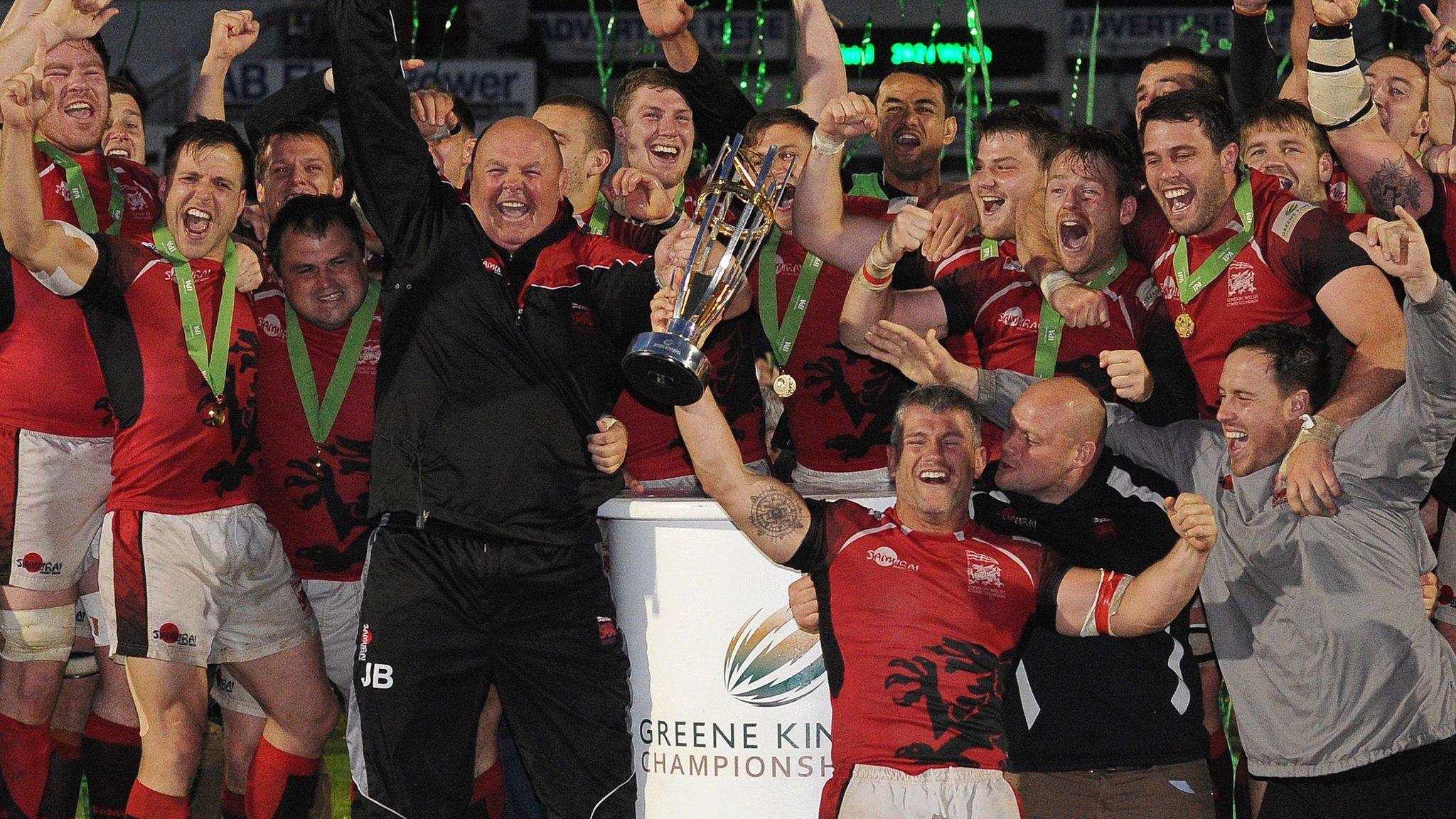
- Published19 January 2017
